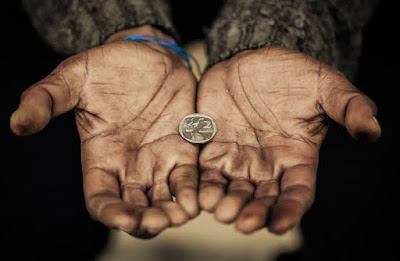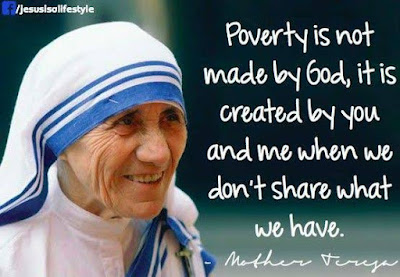SOCIAL JUSTICE AND FRIENDSHIP WITH THE POOR.
September 18, 2022.
Twenty-fifth Sunday in Ordinary Time – C.
 Readings: Am 8:4-7; Ps 113:1-2, 4-6, 7-8; 1 Tm 2:1-8; Lk 16:1-13.
Readings: Am 8:4-7; Ps 113:1-2, 4-6, 7-8; 1 Tm 2:1-8; Lk 16:1-13.
A German proverb says: “He who lends to the poor gets his interest from God.” And an Irish proverb adds: “We give to the rich, and take from the poor.”
The aim of social justice is not so much for equality or equity, but rather to raise the statute of the poor and reduce as much as possible the abyss between the classes of our societies. In practicing social justice, one makes himself friend of the poor and the lest fortunate of this world and consequently, he becomes friend of God. For, God is the friend of the poor.
For a Christian, social justice, or fighting for the rights of the poor is intrinsically linked to faith. It is an act of faith to be just. For, we believe and worship a Lord who made himself equal to the weak, the poor, the outcasts. Therefore, in serving the poor in their needs, we make a cult of adoration to the Lord.
We live in a world where what seems to matter the most are personal interests and profits. All the politics and rules are economically oriented. And in that running for gain and gain and gain, the poor one goes abused and reduced to misery. Our world has become a factory of selected rich and of more poverty. Corruption and evil theories are more likely praised than anything that could help level up the inequalities.
The Catechism warns: “A theory that makes profit the exclusive norm and ultimate end of economic activity is morally unacceptable. The disordered desire for money cannot but produce perverse effects. It is one of the causes of the many conflicts which disturb the social order. A system that "subordinates the basic rights of individuals and of groups to the collective organization of production" is contrary to human dignity. Every practice that reduces persons to nothing more than a means of profit enslaves man, leads to idolizing money, and contributes to the spread of atheism. "You cannot serve God and mammon”.” CCC 2424.
The readings, on this 25th Sunday in the Ordinary Time-C are a call and in the same time a warning on social justice and poverty. We are told that poverty is human creation through corruption. When the systems are corrupted, they can only provoke inequality and so high levels of poverty.
Amos, in the first reading points an accusing finger on the corruption of the rich and the powerful, those “who trample upon the needy and destroy the poor of the land.” All they thoughts, he says, are: “When will the new moon be over, that we may sell our grain, and the Sabbath, that we may display the wheat? We will diminish the ephah, add to the shekel, and fix our scales for cheating! We will buy the lowly for silver, and the poor for a pair of sandals; even the refuse of the wheat we will sell!” That which matters for them is how to make interests? How to increase their profits and benefits, and this is made at the expense of the poor. In a society where interests and profits are all that condition people's life, corruption goes increasingly, integrity is lost and social justice dead.
The words of the Prophet Amos could be well addressed to our today's world where self interests, gain, accumulation are the norms. For money and power many people have lost their dignity. We face all kinds of wars with all types of weapons: Biological, lethal, atomic, nuclear... nothing can stop the war today. The world has anew turned into its bipolar reality that led to the 1st and 2nd World War. And even worse it seems to have a 3rd pole, the indifferent or 3rd classes countries.
In the increase of inequality and the somewhat inevitable 3rd World War, the only possible solution is what Paul suggests in the second reading, prayer. The Apostle invites to pray for leaders. They are the only responsible of corruption or equity, war or peace, poverty or riches, death or life. What they decide as politics are what can determine the destiny and the future of our lives and the world. So, Paul says, “First of all, I ask that supplications, prayers, petitions, and thanksgivings be offered for everyone, for kings and for all in authority, that we may lead a quiet and tranquil life in all devotion and dignity.” It is a Christian duty and an act of obedience to God to pray for leaders. It is not about loving or supporting them, but knowing that our lives depend on them.
In the Gospel, the Lord Jesus points unto the nerve of all our social problems. When man wants to serve money, not only his life goes messy, but the world as well. Money is a good servant but a bad master, says the dictum. The Lord warns us: “You cannot serve both God and mammon.” It is a call to be astute making good use of our material possessions to assure our future, life in God. The parable of the shrewd or astute steward teaches us on what material possessions are really for. The Lord Jesus urges : “I tell you, make friends for yourselves with dishonest wealth, so that when it fails, you will be welcomed into eternal dwellings.”
To be shrewd, the Lord says, is to be able to make use of money and even of our social or political position to build genuine friendships, that is to help others in their needs. To become friends with the poor is to cultivate a friendship with God. In a world strife by individualism, selfishness, and all kinds of thirsts to satisfy the self, only a deep spiritual life can help understand and accept this truth that your money won't save you but only the loving and helping hand you give the poor. As says the Saint of Tortona, “Charity, and only charity will save the world.” For, only charity can fill the abyss of social injustice and corruption and bring us together, rich and poor, closer to God.

Comments
Post a Comment